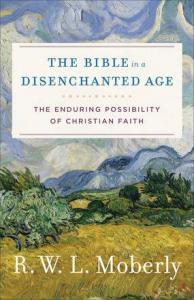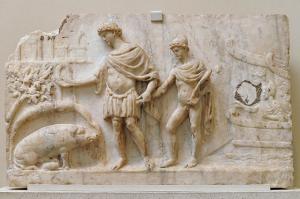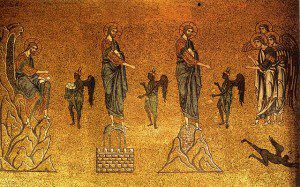 Walter Moberly, The Bible in a Disenchanted Age: The Enduring Possibility of Christian Faith, explains why he finds the Bible and the Christian faith both plausible and convincing. Although the Bible is important, it doesn’t work in a vacuum. In chapter 3 he “suggested that people are most likely to take seriously the Christian privileging of the Bible and Jesus if they encounter the lives of Christians as plausibility structures that moves them towards the Christian way of life and thought, with a possible view towards making it their own.” (p. 130) This is developed further in Chapter 4. The church isn’t simply another social club providing a context for pleasant life together. Moberly continues “more needs to be said about what the persuasive force of Christian witness in the world requires if a person is to become, not just in name, but in reality, someone who believes the biblical witness, and supremely its witness to Jesus – and why such belief should be a good thing.” (pp. 130-131)
Walter Moberly, The Bible in a Disenchanted Age: The Enduring Possibility of Christian Faith, explains why he finds the Bible and the Christian faith both plausible and convincing. Although the Bible is important, it doesn’t work in a vacuum. In chapter 3 he “suggested that people are most likely to take seriously the Christian privileging of the Bible and Jesus if they encounter the lives of Christians as plausibility structures that moves them towards the Christian way of life and thought, with a possible view towards making it their own.” (p. 130) This is developed further in Chapter 4. The church isn’t simply another social club providing a context for pleasant life together. Moberly continues “more needs to be said about what the persuasive force of Christian witness in the world requires if a person is to become, not just in name, but in reality, someone who believes the biblical witness, and supremely its witness to Jesus – and why such belief should be a good thing.” (pp. 130-131)
What does the Bible teach and why should such a belief be a good thing?
 Throughout his book Moberly has used passages from Aeneid 1 and Daniel 7 as case studies to discuss the privileging of the Bible. In the Aeneid, Jupiter bestows on Rome unending dominion over the world, “On them I set no limits, space or time: I have granted them power, empire without end” and establishes a descendant of Aeneas to rule the Roman empire and establish peace.
Throughout his book Moberly has used passages from Aeneid 1 and Daniel 7 as case studies to discuss the privileging of the Bible. In the Aeneid, Jupiter bestows on Rome unending dominion over the world, “On them I set no limits, space or time: I have granted them power, empire without end” and establishes a descendant of Aeneas to rule the Roman empire and establish peace.
 Daniel 7 describes a vision where one like a “son of man” comes before the Ancient of Days and is given dominion and glory and kingship – an everlasting dominion that shall never be destroyed. The Ancient of Days is understood to be Israel’s God. On the surface Aenied 1 and Daniel 7 are similar accounts.
Daniel 7 describes a vision where one like a “son of man” comes before the Ancient of Days and is given dominion and glory and kingship – an everlasting dominion that shall never be destroyed. The Ancient of Days is understood to be Israel’s God. On the surface Aenied 1 and Daniel 7 are similar accounts.
Moberly asks: “If the Bible is not to go the same way as Virgil, and is to be more than interesting religious thought and/or a collection of memorable stories from the past, then on what basis is the case for it to be made?” (p. 144)
To make his case for Daniel as Scripture rather than an interesting, but merely human, ancient text, Moberly turns to Matthew 28:18-20.
Then Jesus came to them and said, “All authority in heaven and on earth has been given to me. Therefore go and make disciples of all nations, baptizing them in the name of the Father and of the Son and of the Holy Spirit, and teaching them to obey everything I have commanded you. And surely I am with you always, to the very end of the age.”
This passage has clear echoes of Daniel 7, “this resurrection appearance of Jesus is appropriately read in relation to – indeed, as a realization of – the Daniel vision.” (p. 145) Of course, the mere reference to Daniel 7 in the Gospel of Matthew isn’t enough to make it Scripture. To make such a claim we would have to begin with the assertion of Matthew as Scripture – a claim as fraught with uncertainty in the modern disenchanted age as any similar claim about Daniel. Matthew 28, however, does indicate the significance of Daniel 7 in the early (Jewish) church. Jesus is not merely a contemporary teacher and example, but the very one who stood before the Ancient of Days (and also the promised Davidic King).
So now we ask, what is the nature and content of Jesus’ authority?
 In Matthew 4 we read the well known story of the temptation of Jesus. The devil offers Jesus dominion if he will only worship him and Jesus replies “Away with you, Satan! For it is written: ‘Worship the Lord your God, and serve him only’.” Power and authority is not given by Satan or for the good of the one to whom it is given. We see this again on the cross and in the events leading up to it. Moberly highlights two passages. Matthew 16 where Peter recognizes Jesus as the Messiah, but then rebukes Jesus for saying that he, as God’s Messiah, must suffer. Peter’s response is very human “Never, Lord! This shall never happen to you!” Jesus turns to Peter, “Get behind me, Satan! You are a stumbling block to me; you do not have in mind the concerns of God, but merely human concerns.” But he has a word for the disciples (and us) from this interchange: “Whoever wants to be my disciple must deny themselves and take up their cross and follow me. For whoever wants to save their life will lose it, but whoever loses their life for me will find it.“
In Matthew 4 we read the well known story of the temptation of Jesus. The devil offers Jesus dominion if he will only worship him and Jesus replies “Away with you, Satan! For it is written: ‘Worship the Lord your God, and serve him only’.” Power and authority is not given by Satan or for the good of the one to whom it is given. We see this again on the cross and in the events leading up to it. Moberly highlights two passages. Matthew 16 where Peter recognizes Jesus as the Messiah, but then rebukes Jesus for saying that he, as God’s Messiah, must suffer. Peter’s response is very human “Never, Lord! This shall never happen to you!” Jesus turns to Peter, “Get behind me, Satan! You are a stumbling block to me; you do not have in mind the concerns of God, but merely human concerns.” But he has a word for the disciples (and us) from this interchange: “Whoever wants to be my disciple must deny themselves and take up their cross and follow me. For whoever wants to save their life will lose it, but whoever loses their life for me will find it.“
Later, on the cross Jesus declines to rescue himself in the face of taunts and mocking.
“You who are going to destroy the temple and build it in three days, save yourself! Come down from the cross, if you are the Son of God!” … “He saved others,” they said, “but he can’t save himself! He’s the king of Israel! Let him come down now from the cross, and we will believe in him. He trusts in God. Let God rescue him now if he wants him, for he said, ‘I am the Son of God.’” (Matthew 27:40-43)
This gives us insight into the authority of Jesus – its purpose and content. Authority is not given for self-preservation and aggrandizement. It is not for the one to whom it is given at all.
It is the Jesus who lives and dies thus – who consistently refuses to use his divine power to make things easier for himself or to save himself – who is raised from the tomb and appears to his disciples saying, “All authority in heaven and on earth has been given to me.” That which he refused to take is given to him. … The fact that Jesus does not use his sonship to his own advantage but rather is willing to undergo suffering and death while being mocked and misunderstood, and yet is then raised from death to receive sovereign and universal authority, gives meaning to this authority. (p. 151)
As Paul makes clear in his letter to the Philippians ch. 2, it is this shape of authority that the disciples and all Christians (especially leaders) are called to follow. A Christian reading of Daniel 7 cannot be considered separate from Matthew 28 and Philippians 2 in the context of the entire New Testament.
Persistence and Community. While the continued reception of texts in the people of God – Israel and Church – is not a sufficient reason for privileging the Bible as Scripture, it is a necessary condition.
We assume and expect, because countless others have assumed and expected before us and found these assumptions and expectations to be fruitful. Thus, questions about privileging the portrayal of the deity and the human-like figure in Daniel 7 are inseparable from the evaluation of those continuing patterns of life and thought that are a constituent part of that privileging: who, for people today, are the significant others whose perspectives are considered desirable? (p. 157)
How does the “supernatural” become “natural” in our world today? That is, how does it become believable and relevant? The answer isn’t signs and wonders, but in the lives of God’s people.
The answer is surely when human lives are so receptive to, so graced by, God that they display God’s own qualities. As a famous passage in Jeremiah says:
Thus says the Lord: Do not let the wise boast in their wisdom, do not let the mighty boast in their might, do not let the wealthy boast in their wealth; but let those who boast boast in this, that they understand and know me, that I am the Lord; I act with steadfast love, justice, and righteousness in the earth, for in these things I delight, says the Lord. (Jer. 9:23-25 [Hebrew 9:22-23])
When human lives display steadfast love, justice, and righteousness, they display what matters more than things that people customarily value (intelligence, strength, money) for they display God’s own qualities. (p. 161)
There is much more in Moberly’s chapter worth considering, but this post is already long. This is a very thought provoking book – both in points of agreement and points of disagreement. Perhaps the best place to end the post is with Moberly’s conclusion to the chapter.
In short, the purpose of privileging the Bible for faith in God is not to say, “Here is truth and elsewhere is error.” Rather, it is a matter of being willing to learn, in light of the sovereignty of the crucified and risen Christ, ways of recognizing and responding to what is and is not of true value in God’s world, wherever one may encounter it. (p. 166)
God is not the answer to that which cannot be otherwise explained – some kind of physical mechanism active in the world. We will not find proof of God in a scientific sense. Moberly considers Bertrand Russel and Richard Dawkins among those who err by expecting God to be an empirical “scientific” explanation for features we observe in the world. This is a flawed approach. Nor is the Bible some kind of self-evidently “magic” book through which we find propositions ruling our lives as God followers. Rather it is a book that leads to wisdom. Certainly we look to the age to come. Resurrection is a foundational Christian hope. But we also look to live as the people of God today.
Frankly, and this is my point, not explicitly Moberly’s, the biggest issue in our disenchanted age is not the defense of the Bible as a privileged book, but the regular failure of Christians to live up to the vision of God we find in the Bible and especially revealed in Jesus and the New Testament. Sexual harassment and abuse, power mongering, focus on the accumulation of wealth, preservation of institutions rather than discipleship and shepherding of God’s people, greed and self-centeredness rather than generosity and servanthood … we could go on.
There are plenty of devout and dedicated Christians – they don’t make the news very often. But we need to make the case for Christian faith and the value of the Bible as Scripture first and foremost through the way we live. Receptiveness to the gospel begins with the work of the Spirit in and through the church.
The authority given to, assumed and modeled by Jesus has the power to transform the ways of the world.
If you wish to contact me directly you may do so at rjs4mail [at] att.net.
If interested you can subscribe to a full text feed of my posts at Musings on Science and Theology.















